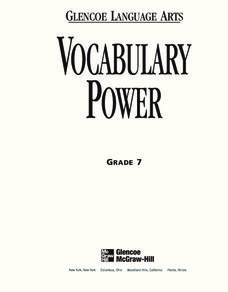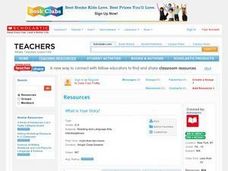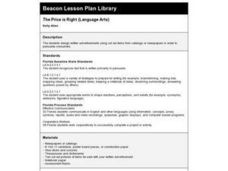Curated OER
What's Your Reference
In this reference material worksheet, students choose the correct reference for each question given. Students discover the differences in the materials found in the dictionary, the almanac, the atlas, the newspaper, and the thesaurus.
Curated OER
Communicating about Our World through Informal Writing
Fifth graders review their writing for repetition of words at the beginning of the sentence. For this informal writing lesson, 5th graders share examples of sentence beginnings. Students use a thesaurus to find antonyms and...
McGraw Hill
Vocabulary Power
Augment your language arts units with a set of vocabulary worksheets. The packet is an excellent support to your vocabulary instruction that covers a variety of skills, including context clues, Greek and Latin roots, reference materials,...
Beacon Learning Center
Power Words
Using words can create a power struggle! Using antonyms and synonyms can create a Power Words game! Check out this instructional activity that teachers your class the difference between the two and how to use a thesaurus.
Curated OER
Homophones and Vivid Verbs
Students define and practice using synonyms, antonyms, homonyms, and homophones in complete sentences, paragraphs and essays. They include "vivid verbs" in their writing with the aid of a dictionary or thesaurus.
Curated OER
The Adventures of Tom Sawyer
Students identify lightning words from The Adventures of Tom Sawyer to complete definition and synonym activities. In this word study lesson plan, students discuss lighting words and read a Mark Twain quote. Students then read specific...
Curated OER
Rooting One's Way To Meaning
Students use a thesaurus on the internet to explore the meanings of Greek and Latin roots. They find definitions of given words, draw a concept map for root words, and write four synonyms for each word. Students discover how Latin and...
Curated OER
Acronym Names
Students create an acronym out of their name. They use a thesaurus and the computer to create it. They also add pictures to make it more creative.
Curated OER
Different Audiences
Students examine levels of language difficulty for different audiences. They explore how to simplify texts to suit a younger audience. Students use a thesaurus to find synonyms. Students select a news article to rewrite. They create...
Florida Center for Reading Research
Dictionary Cube
Young scholars investigate new vocabulary words with a fun, collaborative activity. Given a deck of word cards, pairs of students flip over one at a time and independently look up the term in a dictionary. They then take turns rolling a...
Curated OER
New Hampshire Unplugged
Young historians explore how technology and science affected life in the state of New Hampshire. They define technology and give personal experiences of how technology affects people and how people have used technology. They compare the...
Curated OER
Technopoet - Poetry Lesson Plans
Practice word processing while writing different types of poems. First, elementary and middle schoolers use Word templates to write poetry. They use rhyming and descriptive words as they work with clipart, text wrapping, and picture...
Curated OER
"Spelldown" by Becky Mushko
Learners read Spelldown, by Becky Mushko and consider how it portrays the Appalachian community. They define and discuss vocabulary presented in the story and write a comparison/contrast paper analyzing two of the story's characters. The...
Curated OER
Nouns in a Story
Students, assessing a variety of formatting tools with Microsoft Word, utilize a bank of vocabulary words to make a personal dictionary of nouns. They classify nouns for people, places, things and ideas and separate them into common and...
Curated OER
Context Skills
Here is a fine lesson on teaching ways to use context clues. Upper graders split up into groups and use sticky notes to cover up five words in a passage of text. The passages are rotated to the other groups, and learners must use their...
Florida Center for Reading Research
Vocabulary: Word Meaning, Dictionary Cube
Scholars work together to define words and answer questions using a dictionary cube.
EngageNY
Mid-Unit Assessment: Text-Dependent and Short Answer Questions: Excerpts from “A Limited Supply”
There's no such thing as an unlimited resource. Scholars complete a mid-unit assessment by reading A Limited
Supply. They answer text-dependent questions and complete a graphic organizer about key terms in the text.
Curated OER
Choosing Words Carefully
Use literacy tools to select precise vocabulary. High schoolers respond to discussion questions that require them to consider the denotation and connotation of words. They then read non-fiction passages and identify words in the passages...
Curated OER
What is Your Story?
Students listen to Picnic In October and Memory Coat to explore the concept of memoirs. They interview a family member and write a personal memoir that reflects their own family history.
Shmoop
ELA.CCSS.ELA-Literacy.L.11-12.5
"Timid, scared, terrified." High school scholars examine words, their denotations and connotations, in a series of exercises that use lines from Shakespeare to explore figurative language and word relationships. Participants then...
I Think Diff
Arabic Translator - English Arabic Dictionary
Translate, practice, look-up, and play games with Arabic vocabulary. If you are searching for just about any word in English or Arabic, you will most likely find it here, accompanied by a translation and an audio clip of the pronunciation.
Curated OER
The Power of Words in "Charlotte's Web"
Students analyze the text in Charlotte's Web. In this language arts lesson, students dissect the passages from Charlotte's Web, specifically the adjectives Charlotte used to describe Wilbur. Finally, students play a game using "word...
Curated OER
Vivid Words
In this vocabulary and word study worksheet, students explore the use of vivid words as they complete 8 fill in the blank questions. Students may also complete the challenge question at the bottom of the sheet.
Curated OER
The Price is Right - Advertisements
Fourth graders design written advertisements using cut out items from catalogs or newspapers in order to persuade consumers.

























